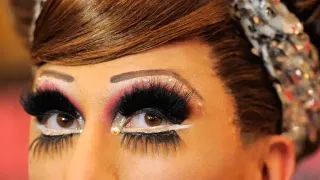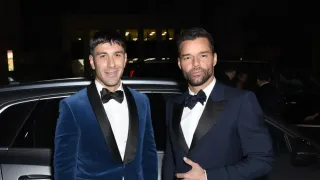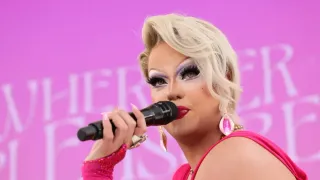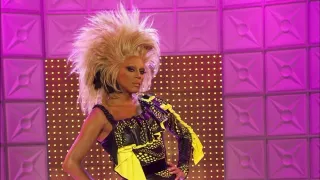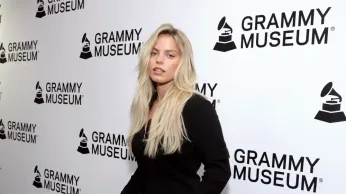
5 hours ago
Reneé Rapp Responds After Betty Cites Her 'Big Lesbian Name' in Drama Around Fletcher and JoJo Siwa Being Involved with Men
READ TIME: 3 MIN.
The summer of 2025 saw a surge in public discourse around queer identity, fueled by statements from leading pop stars. JoJo Siwa, who previously identified as a lesbian, made headlines during Lesbian Visibility Week when she announced she now considers herself to be queer, saying, "I'm switching letters! F**k the 'L,' I'm going to the 'Q!'" Siwa later clarified that she felt pressure to identify as a lesbian, noting, "the pressure came a little bit from inside the community at times." This sparked mixed reactions, especially among lesbian fans who felt alienated by the declaration .
Shortly after, during Pride Month, Fletcher—a prominent sapphic singer—released a song about falling in love with a man. The track, perceived by many fans as an apology or a self-fulfilling prophecy, intensified conversations around the intersection of personal identity and public expectation for queer artists. The queer community, especially those who identify as lesbians and bisexual women, engaged in lively debates about representation, authenticity, and the nuances of sexual fluidity .
In August, bisexual singer Betty Who weighed in, stating that the "alphabet mafia" had made it seem like "a crime to be straight," and unexpectedly referenced Reneé Rapp, a pop star celebrated for her outspoken lesbian identity .
Rapp, known for her unapologetic embrace of her lesbian identity and for challenging stereotypes within the music industry, responded to Betty Who’s remarks in an interview published in early September. Rapp stated: "Don't bring my big f**ing lesbian name into this drama," making it clear she did not want to be used as a counterpoint in a debate she viewed as reductive and unnecessarily divisive .
Her reaction resonated with many fans who felt Rapp’s name was invoked to draw lines between different forms of queer expression—potentially setting up a false dichotomy between “authentic” lesbian identity and the experiences of those whose attraction or relationships do not conform to a singular narrative. Rapp’s stance underscores a broader concern within LGBTQ+ communities: the pressure on public figures to serve as monolithic representatives of their identities, rather than as complex individuals .
Fans and commentators across social media and LGBTQ+ platforms have dissected the exchange, with many expressing support for Rapp’s boundaries. Others pointed to the risks of policing identity within the community, especially when public figures shift or clarify their labels, as Siwa and Fletcher have done. The debate has also surfaced longstanding tensions about the visibility of bisexuality and the challenges bisexual, pansexual, and queer women face when their relationships do not fit lesbian expectations .
Online discussions have examined terms like “sapphic branding”—the marketing of artists as lesbian or queer for visibility—versus the actual diversity of their romantic lives. Critics warn that pressuring celebrities to adhere to rigid labels can lead to erasure and reinforce harmful binaries, while others argue that clarity and consistency remain important for representation, especially for marginalized subgroups within the LGBTQ+ spectrum .
The drama has reignited perennial questions about authenticity, marketing, and visibility for LGBTQ+ pop stars. Siwa’s admission of internal and external pressure to label herself a lesbian reflects a broader dynamic, where celebrities often feel compelled to serve as role models for specific identities. Fletcher’s musical narrative about loving a man, meanwhile, complicates her public image as a sapphic figure, prompting both support and criticism from fans .
Betty Who’s commentary—that the queer community sometimes enforces strict rules about identity—has drawn both agreement and pushback. Some community members see her remarks as a necessary critique of gatekeeping and purism, while others view them as dismissive of very real struggles faced by lesbians, bisexual women, and non-binary people seeking visibility and validation .
Rapp’s insistence on not being used as a rhetorical device in these debates further highlights the tension between individual agency and collective representation. For many LGBTQ+ people, especially those navigating evolving labels, the public scrutiny can feel both empowering and constraining .
YouTube creators and TikTok commentators have analyzed the “lesbian to bisexual to generally sapphic drama” playing out among Fletcher, JoJo Siwa, and Betty Who. Some have characterized the controversy as part of broader “sapphic lore” and pointed out that such online dramas, while juicy, can distract from substantive conversations about representation and inclusion .
The reaction to Rapp’s interview has been described as both scandalous and cathartic, with viewers praising her willingness to speak candidly about the burden of representation and the importance of respecting diverse LGBTQ+ identities .
